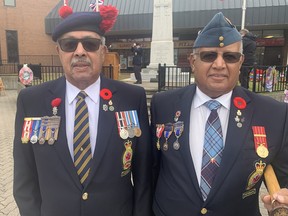
Charlotte Van Maren is a mother seven years old and her brother Lincoln is only five but both have a strong connection to the Second World War.
Advertisement 2
Article content
“All of their great-grandparents were liberated from the Nazis by Canadians when they were about Charlotte and Lincoln’s age,” their father Jonathon explained. “We’re here every year for the Remembrance Day service and last year’s was extra special because we met a veteran who helped with the liberation.
“It was quite a moment and all of us went over to thank him.”
Their great grandparents include Arie Jan and Christina Van Maren and Joe and Pia den Bok on their paternal side. Their maternal grandparents, Kor and Gonnie Van den Hoek and Jacobus and Paula deJonge, were also liberated by the Canadians.
“For us, this is the most important day of the year,” Van Maren said. “We think Remembrance Day should be a national public holiday.
Advertisement 3
Article content
“Surely, it’s more important than Family Day.”
Van Maren said he has always attended the Remembrance Day service and said all of his family is well versed in the hardships endured by the Dutch people during the occupation.
All family members learn about how their family was rescued by the Canadians. They also learned about the Hunger Winter – a famine that took place in Holland during the extremely harsh winter of 1944-45 near the end of the Second World War.
Following the Remembrance Day service, Charlotte and Lincoln joined hundreds of others to pin poppies on a memorial “Lest We Forget” cross in front of the Tillsonburg Cenotaph.
The service, led by Rev. Paul Robinson of St. Andrew’s Presbyterian Church in Tillsonburg, included the singing of O Canada, O God Our Help in Ages Past and God Save the King led by the students from the Oxford Reformed Christian School.
Advertisement 4
Article content

Bugler Nathan Pol performed The Last Post and The Rouse while Mike Pritchard, a piper, played The Lament.
The service also included a reading of In Flanders’ Fields, a poem written by Lt. Col. John McCrae, a Canadian physician who served in the First World War, and The Act of Remembrance.
Wreaths representing first responders, the Canadian Armed Forces, local legions and others were laid at the cenotaph as part of the service.
Robinson recounted the death toll of Canadians killed in overseas conflict including the First and Second World Wars, as well as in Korea and Afghanistan.
“They gave up their tomorrows for our today,” Robinson said.

Randy Boughner was an airborne medic serving with the Canadian forces for 24 years in deeply conflicted areas of the world including Bosnia, Kosovo and Somalia. At home, he assisted in cleaning up the January 1988 ice storm that caused massive damage to many Canadians in Quebec, parts of Ontario and New Brunswick.
Advertisement 5
Article content
“This is a day that is always extraordinary to me,” Boughner said. “I have post-traumatic stress disorder and I have damage to my knees, my back and my ankles.
“I probably shouldn’t be alive but I am and I’m fortunate to be out and about.”
Boughner said he feels grateful every day.
Darrell Ball, a Canadian veteran, also attended Monday’s service to remember those who served including his great-uncle L. Col. Frank Brinn, who fought and died in the First World War.

“He’s buried in France,” Ball said. “He was wounded at Vimy Ridge when he got shot in the leg.
“He had a chance to go home but instead went back to the front and he was killed at Canal Du Nord.”
The Battle of Canal du Nord took place between the end of September into the beginning of October 1918. It was part of the One Hundred Days offensive by the allies.
“He was a great uncle in more ways than one,” Ball said.
twitter.com/EXPVBall
Article content
